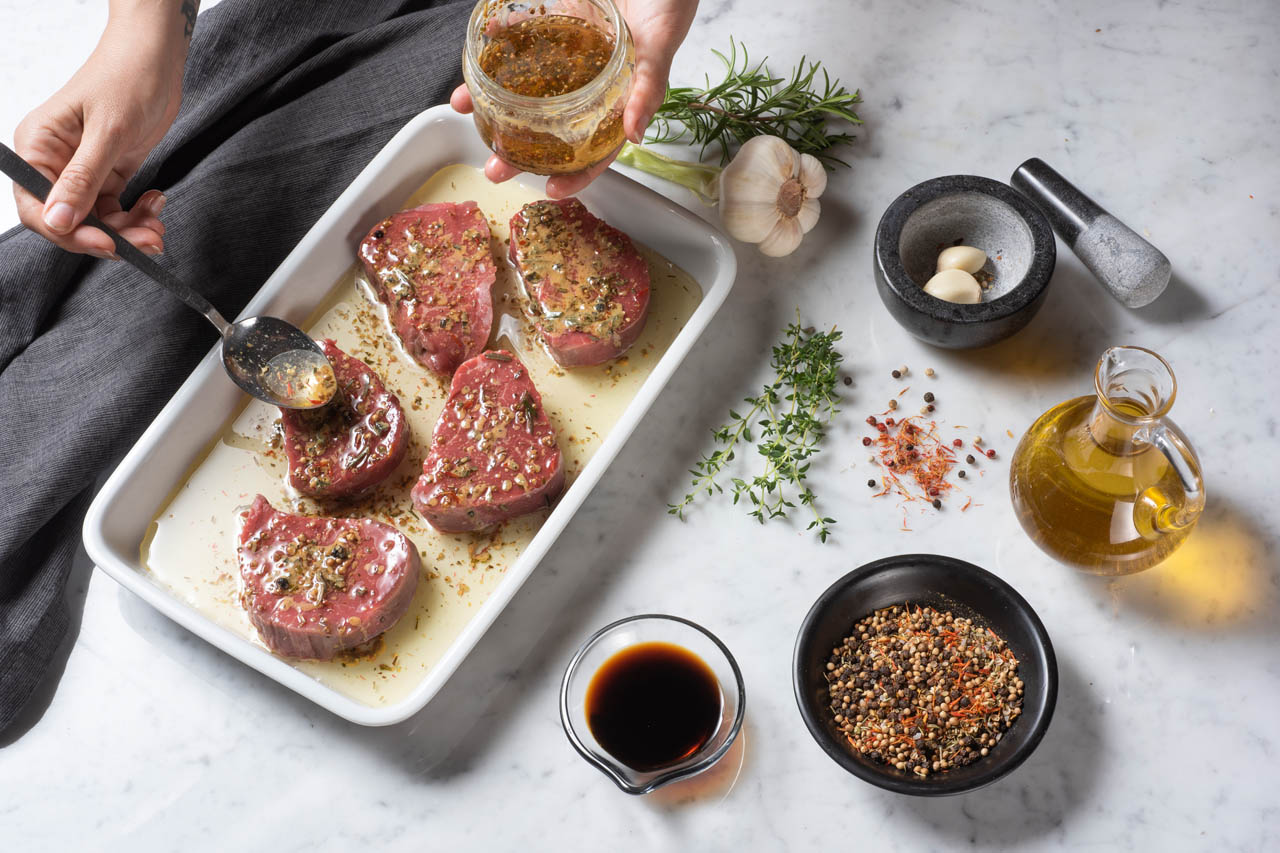
Marinating is a foolproof way to improve the flavour and texture of your meat, fish and even veggies. While it’s often a particularly hot topic during summer BBQ season, marinating is a versatile technique that can also give a boost to ingredients that are being roasted or sauteed as well as grilled.
While boundless flavour combinations are possible, most marinades are made with the same basic ingredients, which means creating or customizing a DIY marinade at home is easier than you might think. Here’s how to get started using marinades to create your juiciest steak, tenderest chicken and savouriest fish yet.
Related: A Guide to Cooking Oils: Everything You Need to Know

Get the recipe: Grilled Sticky-Sweet Lemongrass Chicken Thighs
What are the main ingredients when marinating?
While you can’t go wrong with following a great step-by-step marinade recipe, once you know the standard components in a marinade, you can throw one together using whatever ingredients you have on hand (for a big zero-waste kitchen win!) or to best suit your flavour preferences.
Oil/Fat
Fats coat the meat, helping the marinade cling to its surface and infuse it with flavour. Fats are also key to locking in all that wonderful moisture, so the meat stays tender during cooking. Depending on the fat, they can also add subtle flavour or soften more acidic components in the marinade’s taste profile. Examples of fats that work well in marinades include: olive, avocado, sesame and vegetable oils; as well as buttermilk, yogurt or coconut milk.
Acid
The acid component of the marinade tenderizes the meat while also adding zingy flavour. By breaking down the meat’s connective tissue, acids also help the marinade penetrate deeper for a boost of flavour. Examples of acids you can add to a marinade include: citrus juices, wine, vinegar and beer.
Related: A Definitive Guide to Vinegar
Seasonings
Seasonings are the primary ingredient that gives the marinade its flavour. This is where you can really get creative adding ingredients like chili powder, hot sauce, barbecue sauce, ketchup, mustard, as well as both fresh and dried herbs like rosemary and oregano.
Sweeteners
Sweeteners are also often added to a marinade to balance out its acidic flavours and create a pleasant char on your meat. Ingredients like brown sugar, molasses, honey and agave nectar will caramelize during lower temperature cooking methods like roasting, bringing new depths of rich flavour to your dish. Tread carefully, however, using sweeteners when working with higher temp cooking methods like grilling because they can cause the marinade to burn.
While the ratio of ingredients in your marinade is a matter of taste, a formula of three parts fat, one part acid, one part seasoning is a reliable starting point. Whisk your fat and acidic components together, then add your seasonings. You’ll want to make about ½ cup of marinade per pound of meat. Place your meat in a zip-top bag, pour your marinade over top and seal the bag closed.

Get the recipe: Whole Roasted Tandoori Chicken
How long should you let something marinate?
Longer isn’t necessarily better when it comes to marinating, since the acid in the marinade can cause your meat to become too mushy or too tough if they hang out together for too long. The ideal length of time for marinating depends on the meat and the cut. In general, 30 minutes to 4 hours is plenty of time for lean meats, while tough cuts can stand up to longer marinating times, from 4 to 12 hours. Here are some general guidelines:
While marinating is best associated with meats, veggies can reap the same flavour and texture perks from the process. Soft veggies like tomatoes and zucchini can marinate for around 10 to 15 minutes, while firmer veggies like potatoes or cauliflower can benefit from a longer marinating time of over 30 minutes.
How do you marinate effectively?
Read more: The Ultimate Guide to Cooking with Wine
